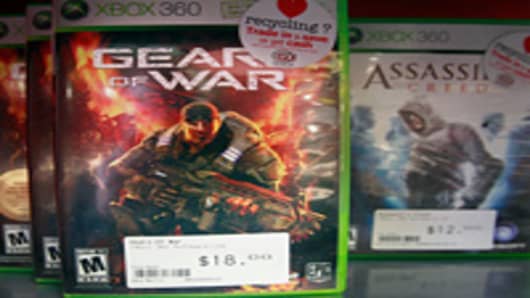2011 isn't looking much better than 2010 or 2009 for retail sales of video games.
Despite comparing with weak numbers from a year ago, game software sales were down 5 percent last month versus 12 months earlier, coming in at $576 million, according to NPD Group, which tracks the industry. Overall, the industry was down 6 percent, dragged lower by continued weakness in the hardware category.
The news isn't quite as bad as it might appear, though. January's decline was far better than some analysts had predicted. Wedbush Securities had forecast software sales to be down as much as 11 percent.
Hardware sales, while light, also defied expectations — falling 8 percent versus the expected 31 percent. Given that January is always a light month for hardware sales as people tend to buy game machines during the holidays, the decline is far from troubling. Peripheral sales, meanwhile, which included Microsoft's Kinect and Sony's PlayStation Move controller, were up 6 percent.
Year to date, the industry is 4 percent off of last year's anemic pace, with overall sales of $1.14 billion.
It was catalog sales that topped the sales charts in January. Activision-Blizzard's "Call of Duty: Black Ops" was the month's best-selling game, while Ubisoft's "Just Dance 2" came in and number two. The months' two new releases — Electronic Arts' "Dead Space 2" and Sony's "Little Big Planet 2" — took the number three and four spots.
While the retail numbers continue to decline, it's important to note that brick and mortar stores like GameStop continue to lose market share to digital forms of distribution. In today's gaming market, in fact, they represent just 60 percent of the overall revenue in the video game industry. Used games, game rentals, subscriptions, digital full game downloads, social network games, downloadable content and mobile game apps all contribute to the bottom line of publishers — and are a growing force.
Many analysts are expecting retail sales to continue their decline versus previous years in 2011. Some, like Wedbush's Michael Pachter, however, think new hardware products, such as Nintendo's 3DS handheld system, could spark a rebound, and that patient investors could be rewarded.
"We think that consecutive sales declines in 2009 and 2010 position the industry for a rebound," wrote Pachter in a note to investors. "However, while we expect a rebound in 2011, we think that the first two or three months face difficult comparisons, and do not expect sales growth to commence until late March, when the Nintendo 3DS launches."
In addition to the 3DS, which is generating advance buzz among players eager to experience 3D games without having to wear special glasses, most analysts expect 2011 will bring hardware price cuts to the industry, which will further boost sales.
No console manufacturer reduced their retail prices last year (though each did offer their machines bundled with games and/or peripherals for the same price). Most analysts feel a $50 across-the-board price cut will come before the end of the year.


